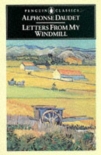Letters From My Windmill by Alphonse Daudet (the first e reader .txt) 📗

- Author: Alphonse Daudet
Book online «Letters From My Windmill by Alphonse Daudet (the first e reader .txt) 📗». Author Alphonse Daudet
Even now, despite the end of the bad times, and the hard-won goodfortune, both the settler and his wife were up before anyone else onthe farm. At an ungodly hour they could be heard coming and going,overlooking the workers' coffee, in the huge kitchens on the groundfloor. Shortly afterwards, a bell was rung and the workmen set out forthe day's work. There were some Burgundy wine-growers, Kabyle workersin rags and red tarbooshes, bare-legged Mahonian terrace workers,Maltese, and people from Lucca; men from many places and therefore moredifficult to manage. Outside the door, the farmer curtly gave out theday's work to everyone. When he was finished, this fine man looked upand scrutinised the sky anxiously. Then, he noticed me at the window:
—Awful growing weather, he told me, here comes the sirocco.
In fact, as the sun rose waves of hot, suffocating air came in from thesouth as though an oven door had briefly opened. We didn't know whereto put ourselves or what to do. The whole morning was like this. Wetook coffee sitting on mats in the gallery, without finding the willpower to move or speak. The dogs, stretched out, hoping the flagstoneswould keep them cool, looked utterly washed out. Lunch picked us up abit; it was a generous if singular meal, and included carp, trout, wildboar, hedgehog, Staouëli butter, Crescian wines, guavas, and bananas.All in all, an improbability of delicacies which nevertheless reflectedthe complex variety of nature which surrounded us…. We were justabout to get up from the table, when shouts rang out from behind theclosed French window, shouts that guaranteed that we would soonexperience first-hand the furnace-like heat in the garden:
—Locusts! Locusts!
My host paled, as any man would who had been told of an impendingcatastrophe, and we shot outside. For ten minutes, in the farmhouse,once so calm, there was the sound of running footsteps, and indistinctvoices lost in the sudden panic. From the shade of the dormitories, theservants rushed outside banging and clanging anything that came tohand; sticks, forks, flails, copper cauldrons, basins, saucepans. Theshepherds blew their horns, others blew their conches or their huntinghorns; a fearfully discordant racket, soon overlaid by the shrillvoices of the Arab women ululating as they rushed out from nearbycaves. Sometimes, setting up a great racket and a resonant vibration inthe air is enough to send the locusts away, or at least to stop themcoming down.
So, where were they then, these awful creatures? In a sky vibrant withheat, I saw nothing except a solitary cloud forming on the horizon, adense, copper-coloured, hail-cloud, but making a din like a storm in aforest. It was the locusts. They flew en masse, suspended on theirlong, thin wings and despite all the shouting and effort, they justkept on coming, casting a huge, threatening shadow over the plain. Soonthey were overhead. The edges of the cloud frayed momentarily and thenbroke away, as some of them, distinct and reddish, peeled off from therest like the first few drops of a shower. Then, the whole cloud burstand a hailstorm of insects fell thick, fast, and loud. As far as theeye could see, the fields were completely obliterated by locusts. Andthey were enormous; each one as big as a finger.
Then the killing began to a hideous squelching sound like straw beingcrushed. The heaving soil was turned over using harrows, mattocks, andploughs. But the more you killed, the more of them there were. Theyswarmed in waves, their front legs all tangled up, their back legsleaping for dear life—sometimes into the path of the horses harnessedup for this bizarre work. The farm dogs, and some from the caves, werereleased onto the fields, and fell amongst them crunching them in afrenzy. Then, two companies of Turks following their buglers came tothe aid of the colonists, and the massacre changed complexioncompletely.
They didn't crush the locusts, they burnt them with a wide sprinklingof gunpowder.
I was drained by all this killing and sickened by the smell, so I wentback into the farmhouse, but there were almost as many in there. Theyhad come in through the open doors and windows and down the chimney. Onthe woodwork and curtains, already stripped, they crawled, fell,fluttered, and climbed up the white wall, casting huge shadows makingthem look even uglier. And there was just no getting away from theawful stench.
Later, we had to do without water with our meal as the tanks, basins,wells, and fish ponds were all covered over with dead locusts. In theevening, in my room, where many had been killed, I heard a buzzingunder the furniture, and the cracking of wing cases, which sounded likeplant pods bursting in the sweltering heat. Naturally, I couldn't sleepagain. Besides, everybody else was still noisily busy all over thefarm. Flames were spreading over the ground from one end of the plainto the other; the Turks were still in their killing fields.
The next day, opening my window, I could see that the locusts weregone. But what total devastation they left behind. There wasn't asingle flower, or a blade





Comments (0)